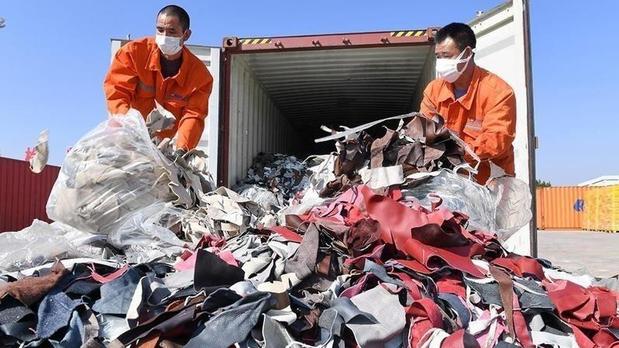 In this undated photo, workers check a load of imported leather scraps in China’s Xiamen, Fujian province. (LIN SHANCHUAN / XINHUA)
In this undated photo, workers check a load of imported leather scraps in China’s Xiamen, Fujian province. (LIN SHANCHUAN / XINHUA)
With a Chinese ban on imports of solid waste having come in at the start of the year, countries in the region are stepping up their recycling efforts.
Mageswari Sangaralingam, a research officer at the Consumers' Association of Penang in Malaysia, said the Chinese move coincides with new conditions under the Basel Convention Plastic Waste Amendments also taking effect on Jan 1.
Due to environmental and health considerations, China's ban applies to the dumping, stacking and disposal of solid waste from overseas on Chinese soil. The Chinese decision has galvanized efforts in many countries to reduce their own waste.
ALSO READ: In green milestone, China to end solid waste imports
Though it is too soon to gauge the impact of China's blanket ban, Sangaralingam said the Malaysian government has revised the conditions on waste imports, including plastics, scrap metal and electronic waste, to address dumping concerns.
"Imports of plastic waste with approved permits are allowed but with strict conditions imposed on importers and exporters," Sangaralingam said.
Malaysia has recorded an increase in plastic waste imports since January 2018. Citing an annual Beach Cleanup Report from October 2020, Sangaralingam said US plastic waste exports to Malaysia have surged to 12 million kilograms, equivalent to 75 shipping containers of twenty-foot equivalent units, or TEU, each day.
A study published by the scientific journal Science Advances last year revealed that the US was the world's top generator of plastic waste and it ranked third when it comes to contributing to plastic waste in the oceans.
The study looked at US plastic waste exports to Asian countries with poor waste management and high levels of plastic pollution in their waters. Vietnam saw a surge to 5.9 million kilograms, equivalent to 37 TEU containers a day.
Sangaralingam said there could be transshipment from the US and other countries in the Organization for Economic Cooperation and Development to circumvent restrictions.
In neighboring Indonesia, the government plans to return containers of hazardous materials back to the US, the United Kingdom, Australia and New Zealand this year.
You cannot just export your way out of this problem of plastic waste because before, all of our PET bottles (were) exported to China to make polyester.
Jonathan Co, project head at Sentinel Upcycling Technologies
Jonathan Co, project head at Sentinel Upcycling Technologies, a manufacturer of upcycled products in the Philippines, said the Chinese ban has "lit a fire" among Filipinos.
"You cannot just export your way out of this problem of plastic waste because before, all of our PET bottles (were) exported to China to make polyester," Co said, adding that the Chinese ban would drive down the prices for the waste.
Aileen Lucero, national coordinator at EcoWaste Coalition, a nonprofit environmental group in the Philippines, hailed the return of the last batch of so-called re-exported containers to South Korea last year.
Policy goals
The return to South Korea of 7,408 tons of illegal plastic waste shipments-amounting to 364 shipping containers-began on Jan 19, 2019. The last batch of 43 containers-or 1,036 tons-was sent back to Pyeongtaek City on Sept 15, 2020.
Lucero said the return of the illegal waste shipments from South Korea emboldened environmental health campaigners to push for two policy goals: ratification by the Philippine government of the Basel Convention Ban Amendment, so that dumping can't resume, and for the government to ban imports of foreign waste.
The Basel Convention, which controls the cross-boundary movement of hazardous waste, was adopted in 1989 in response to a public outcry following the dumping of toxic waste in Africa and other places in the developing world.
The Ban Amendment, which entered into force in December 2019, prohibits the export of hazardous waste from member states of the European Union and the OECD, as well as Liechtenstein.
"Environmental health and justice groups have strongly argued that ratifying the Basel Convention Ban Amendment and imposing a national ban on all waste imports, including electronic, plastic and other hazardous and toxic wastes, are essential to prevent the recurrence of waste dumping and trafficking incidents," said Lucero.
READ MORE: Output push to boost demand for imported recycled metals
Contact the writer at jan@chinadailyasiapac.com


